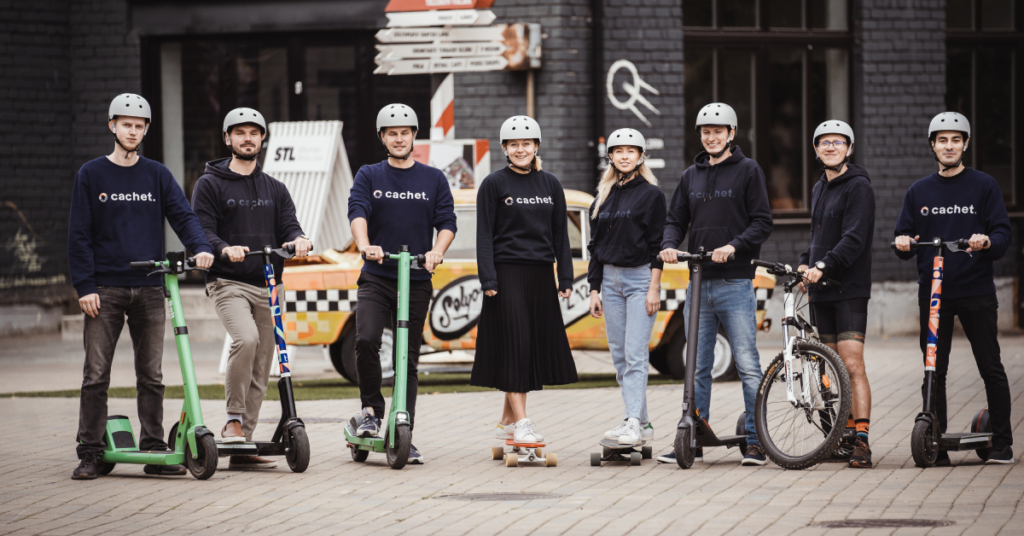
05.10.2021 •
Electric scooters require a smart solution
When electric scooters appeared in our cityscape some years ago, it was clear that these were going to be a hit in the future world of sustainable transport. But this fast and convenient alternative also sparked new concerns about the increasing number of traffic accidents. The number of scooter accidents has tripled this year compared to the summer of 2020. Just last week I read about yet another devastating accident where a scootering child collided with a car.
Our northern neighbours have reacted to this by restricting or banning the use of electric scooters. But why ban, even partially, eco-friendly means of transport? Instead, we should acknowledge that it takes time to get used to this new means of transport and focus on prevention and educating people. Smaller communities also have the power to change people’s behaviour, not just the lawmakers and local authorities.
Tallinn took initiative and painted the city streets partially red for city riders, which caused a great deal of uproar. This is a striking indication of the city’s awareness of the general problem, even if the solution itself still falls a bit short. Bikers and scooter riders are the more fragile participants in city traffic and need a safer traffic space. However, we cannot forget that the most delicate party on the sidewalk is the pedestrian, who in turn needs to be protected from city riders.
Let’s do something about it!
The statistics are dismal: more than 300 bikers and e-scooter riders have been injured in Estonia this year. Most of these accidents happen because the rider overestimates their skills or violates traffic rules. There are probably at least as many unreported cases wherein the injured person simply limps home or pays for the damages out of their own pocket.
You fasten the seat belt, follow the speed limit and stay sober when driving the car, right? Scooters, bicycles and skateboards should be approached the same way – wear a helmet, don’t use the rideable in ways it’s not meant to be used, don’t carry several persons, don’t speed, don’t ride when drunk, follow the traffic rules. Common sense, right? But for some reason, we act differently in reality, as if the scooter rider is not part of real traffic, as if they’re just a video game character with multiple lives.
In addition to ordinary road users, there are also many food delivery and other couriers rushing around the city on e-scooters. We are all probably glad there are fewer cars on the road thanks to that. By now protecting the environment has become so important to many people in small Estonia as well as the big wide world that it dictates their daily choices.
This is also one of the main reasons for choosing a bicycle or an e-scooter over a car or taxi – it’s better for the environment. Unfortunately, electric rideables and bicycles are not covered by compulsory insurance like other vehicles, which means that this eco-friendly choice is a potential health risk.
When there is no sick leave
Insurance is a small but practical part of traffic culture. Until the traffic culture improves, users of city riders will continue to run into everyday problems such as compensation for damage caused in traffic accidents and payment of medical bills. Who covers these costs, if there is no insurance?
So far everyone has had to pay out of their own pocket, which has led to quarrels and disputes, justifications and slander, hurt feelings and losses. It would offer great reassurance if everyone could ride around knowing that they are protected in the event of an accident and don’t have to fight for help.
If we take, for example, the food delivery couriers mentioned earlier – insurance that pays for their treatment in case of an accident (or helps to compensate for any damage caused by you) could be an essential part of an employment contract for any such profession. Many may not know this, but gig workers, such as couriers and taxi drivers, do not have the luxury of taking a sick leave. This is something to think about.
It should be about the person, not their city rider
The upcoming local government elections will focus on the city and mobility, including the network of bicycle and scooter paths. A well-thought-out network of pathways is one way of protecting people from accidents in the future. However, citizens must also embrace these changes in infrastructure – every one of us has to understand that our correct and safe choices make the roads safer.
Therefore, we have to take the reins to shape the traffic culture. Cachet did this with a new kind of city rider insurance that is individual-based and protects otherwise unprotected users of city riders. This means that instead of insuring your rideable, you insure your own health and any damage you cause to others.
Estonian streets are changing and it is not at all a bad thing. We just really need to acknowledge this change and keep up with it in every aspect. The person on the street needs insurance just as much as a car. So ride around however you like – the most important thing is that you and your rideable are protected!
I will conclude by encouraging everyone to favour sustainable means of transport, such as bicycles, skateboards and scooters, because these small choices lead to big changes.

